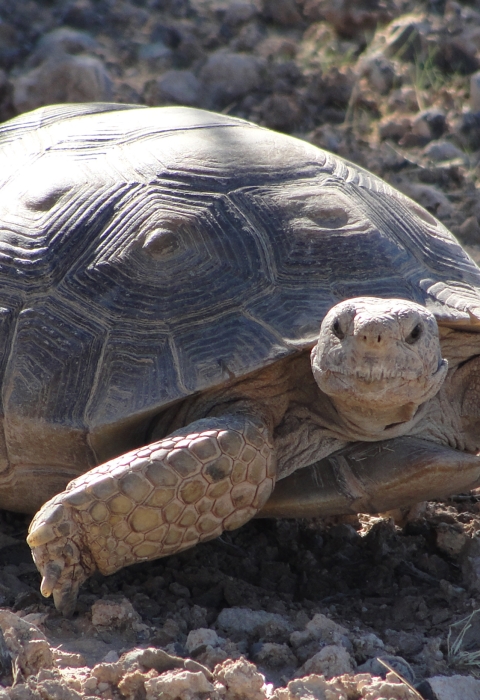Overview
The Mojave population of desert tortoise (Gopherus agassizii) includes all tortoises north and west of the Colorado River in Arizona, Utah, Nevada and California. Listed as threatened in 1990, these tortoises are impacted by ongoing threats, including loss, degradation and fragmentation of habitat due to development. They are also impacted by increased wildfire due to non-native invasive vegetation, disease, road mortality and predation of their eggs and hatchlings.
Scientific Name
Identification Numbers
Characteristics
Habitat
Mojave population of desert tortoise lives in a variety of habitats from sandy flats to rocky foothills, including alluvial fans, washes and canyons.
Arid land with usually sparse vegetation.
Behavior
The desert tortoise hibernates in burrows for up to nine months each year, and is most active from March to June and September to October.
Physical Characteristics
The desert tortoise has a top shell is brown, gray or black, and the shell underneath is lighter.
The desert tortoise produces a variety of sounds - hisses, grunts, pops, whoops, huhs, echs, bips, etc.
The desert tortoise has a short tail, flattened front legs that are adapted for digging, elephant-like hind legs and a high-domed shell.
Measurements
Shell height: 4 to 6 inches
Shell length: 8 to 15 inches
Adult tortoises weigh eight to 15 pounds.
Life Cycle
Desert tortoises can live roughly 50 to 80 years, but take 13 to 20 years to reach sexual maturity.
Food
The desert tortoise eat various herbs, grasses, cacti and wildflowers.
Timeline
Explore the information available for this taxon's timeline. You can select an event on the timeline to view more information, or cycle through the content available in the carousel below.
42 Items